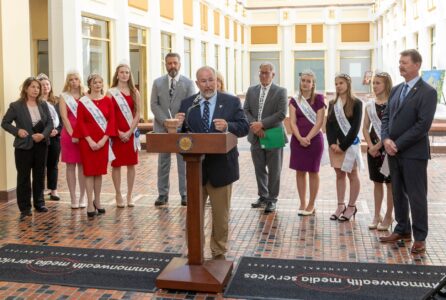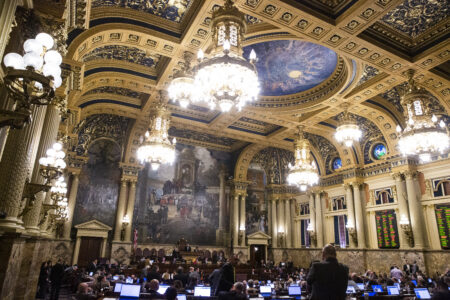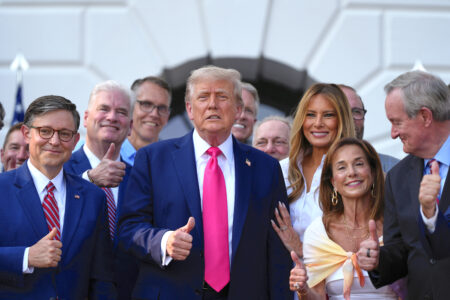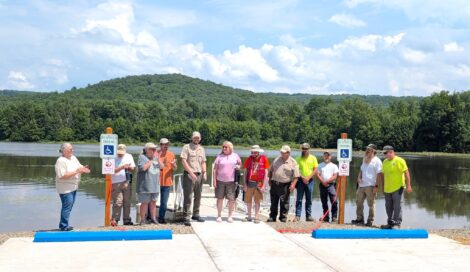Local paper downplays what we now know as the Gettysburg Address
- Photo from the Library of Congress This is believed to be the only image of President Abraham Lincoln taken on the day he uttered the most famous words ever spoken by a U.S. president.
- Photo from the Warren Mail Here’s the initial reporting of the Gettysburg Address in the Warren Mail – on page two, 1.5 columns into coverage of the events of the day.

Photo from the Library of Congress This is believed to be the only image of President Abraham Lincoln taken on the day he uttered the most famous words ever spoken by a U.S. president.
158 years ago yesterday, the most famous speech in the history of our nation was given.
The words have transcended time. Not only was the 2.5 minute speech indicative of a change in philosophy when it was given. It has also come to describe some of our nation’s highest ideals today.
“Four score and seven years ago….”
That famed address was given at the dedication of the country’s first national cemetery in what had been a sleepy town in Adams County, Pennsylvania.
Three days in July changed all that. Thousands of dead bodies were hastily buried in and around Gettysburg in the wake of that battle. The idea of a cemetery started locally and turned into a national effort. Part of the driving motivation? Necessity. The bodies needed to go somewhere.

Photo from the Warren Mail Here’s the initial reporting of the Gettysburg Address in the Warren Mail - on page two, 1.5 columns into coverage of the events of the day.
“The contract for disinterring the bodies on the Gettysburg battlefield and at the surrounding hospitals, and again interring them in the Soldier’s National Cemetery, has been awarded to John Hoke and Franklin Biesecker at $1.59 per body,” the Nov. 21, 1863 Warren Mail reported. “The work is to be commenced immediately, the cemetery grounds having been appropriately laid out for this purpose.”
That process was still underway when the cemetery was dedicated on Nov. 19, 1863.
President Abraham Lincoln was asked to give a ‘few appropriate remarks’ but he wasn’t the star of the show – that fell to famed orator Edward Everett who gave an address that lasted two hours, covering the battle but also its significance in great depth.
From the Warren Mail on Nov. 28, 1863, the first mention of the ceremony in the local paper.
“It is estimated that 12,000 people were present at the Dedication of the National Cemetery at Gettysburg on the 19th inst. Hon. Edward Everett’s Address was worthy of the author’s fame and fully up to the patriotic and solemn grandeur of the occasion. We have not room for all he said in an hour and a half, but we cannot omit his masterly exposition of the heresy of states rights….”
The paper gave two-and-a-half columns to the ceremony. The first 1.5 belonged to Everett.
The Mail dedicated several paragraphs to his states rights arguments. “We are told by the leaders of the rebellion that in our complex system of government the separate States are ‘Sovereign’ and that the central power is only an ‘agency’ established by these sovereigns to manage certain affairs which they could not so conveniently administer themselves. It happens unfortunately for this theory that the Federal Constitution… nowhere recognises the states as ‘sovereigns’….
“Pardon me, my friends for dwelling on these wretched sophistries. But it is these which conducted the armed hosts of rebellion to your doors on the terrible and glorious days of July, and which have brought upon the whole land the scourge of an aggressive and wicked war – a war which can have no other termination compatible with the permanent safety and welfare of the country, but the complete destruction of the military power of the enemy….” It cannot be that the people of the loyal States – that twenty two millions of brave and prosperous freemen – will for the temptation of a brief truce in an eternal border war consent to this hideous national suicide.”
Everett sought to put the battle in context, to fully explore its significance.
“No man can deplore more than I do the miseries of every kind unavoidably instant to war. Who could stand on this spot and call to mind the scenes of 1-3 of July with any other feeling? A sad foreboding of what would ensue, if war should break out between North and South, has haunted me through life, and led me, perhaps, too long to tread in the path of hopeless compromise, in the fond endeavor to conciliate those who were pre-determined not to be conciliated.”
12,000 was a conservative estimate for the number of people that gathered in Gettysburg for the event. Other sources go higher.
After a two-hour speech, what came next must have felt like an afterthought. Just picture it – you’ve been spellbound by a thrilling speech by one of the nation’s best speakers (remember, this was a key form of information distribution at the time). Then, here comes the politician. And, at this point, one that had a very questionable level of popularity.
“At the close of the oration, which occupied an hour and a half in its delivery, a dirge was sung by the Union Glee Club of Baltimore,” the Mail reported. “The President then appeared at the foot of the platform and upon being introduced by the Marshal, was vociferously cheered by the vast audience. He then spoke as follows:”
Speech of the President
Four score and seven years ago our fathers brought forth on this continent a new nation, conceived in liberty and dedicated to the proposition that all men are equal. Now we are engaged in a great civil war, testing whether that nation or any nation so conceived and so dedicated, can long endure. We are now on a great battle field of that war. We are met to dedicate a portion of that field as the final resting-place of those who have given their last life-blood that that nation might live. But in a larger sense we cannot dedicate, we cannot consecrate, we cannot hallow this ground. The brave men living and dead who struggled here have consecrated far above our poor power to add to or detract. (Applause.) The world will little know nor long remember what we say; but it can never forget what they did here. (Applause). And it is for us living to be dedicated here to the unfinished work that they have thus far so nobly carried forward. It is rather for us here to be dedicated to the great task remaining before us, that from this honored day we take increased devotion to that cause for which they here gave the last full measure of devotion. That we here highly resolve that these dead shall not have died in vain; that the nation shall, under God, have a new birth of freedom. (Applause.) And that government of the people, by the people, and for the people, shall not perish from the earth. (Applause.)
That is verbatim how the speech appeared in the Warren Mail. It’s not often what we often hear recited – some words are changed, others are added, some are missing.
Responses to the speeches were mixed. Buried in the second column of coverage, probably below the fold, the editors of the Warren Mail clearly didn’t know the power of the text they were setting that day.
I can’t look past the irony of just how buried that speech was. Think of some of the most important days in our nation’s history – the moon landings, D-Day, JFK’s assassination. Would you expect to see those events on the inside of a newspaper and below the fold?
I could stand on a soapbox for 50 column inches about the significance of the speech. Thankfully (for the reader), I won’t. But it is important to remember just how the speech reframed what the war was about, what kind of nation Lincoln envisioned on the other side.
The “unfinished work” that Lincoln spoke of is still ongoing. It’s our responsibility today.
There are multiple versions of the speech. We don’t know exactly where the speech was delivered (we have a pretty good idea but nothing certain). President Lincoln today has no living, direct descendants.
Perhaps that’s all for the best. I wonder if it gives us space to claim our piece of that vision and of the man himself.
We live in the most hotly partisan period of my (admittedly not that long) lifetime. I’ve heard the comparisons of our day to the years in advance of the Civil War. That still feels like hyperbole to me.
But one thing is certain: We all – Republican and Democrat – need to hear what Lincoln was calling us to that day in 1863.
“It is rather for us here to be dedicated to the great task remaining before us, that from this honored day we take increased devotion to that cause for which they here gave the last full measure of devotion. That we here highly resolve that these dead shall not have died in vain; that the nation shall, under God, have a new birth of freedom. And that government of the people, by the people, and for the people, shall not perish from the earth.”






